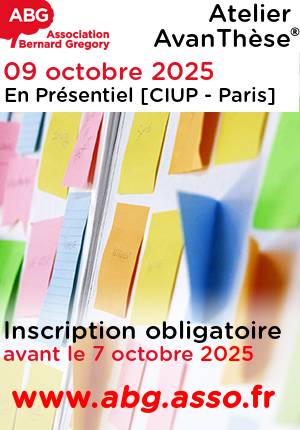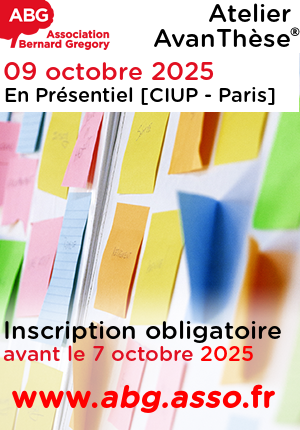Développement d'un modèle neuronal prédictif et génératif de la beauté, basé sur l'intelligence artificielle // Development of a predictive and generative neural model of beauty, based on artificial intelligence
|
ABG-133582
ADUM-67641 |
Sujet de Thèse | |
| 27/09/2025 | Contrat doctoral |
Université de Montpellier
Montpellier cedex 5 - Occitanie - France
Développement d'un modèle neuronal prédictif et génératif de la beauté, basé sur l'intelligence artificielle // Development of a predictive and generative neural model of beauty, based on artificial intelligence
- Informatique
IA générative, modèle neuronal, beauté
Generative AI, neural model, beauty
Generative AI, neural model, beauty
Description du sujet
En biologie, la théorie la plus influente sur l'esthétique est celle de la fluence. Elle postule que l'attractivité d'un stimulus est accrue par la fluence, c'est-à-dire la facilité avec laquelle le cerveau traite l'information. Cette facilité de traitement est considérée comme le mécanisme fondateur du jugement de beauté. Bien que la théorie de la fluence soit capable d'expliquer de nombreux phénomènes esthétiques, tant universels que subjectifs, son étude reste aujourd'hui limitée par l'absence de définition mécaniste : en psychologie, la fluence est définie comme un ressenti subjectif, une sensation. Une caractérisation quantitative et répétable de la fluence est nécessaire pour faciliter son étude scientifique chez l'homme et son application aux autres animaux.
L'objectif de cette thèse est de proposer une formalisation mathématique de la fluence à l'aide de modèles d'intelligence artificielle.
Nous avons précédemment proposé de formaliser la fluence à travers la notion d'efficience de traitement de l'information. Nous avons notamment montré que la sparsité des activations neuronales mesurée dans un réseau de neurones artificiels est un bon prédicteur de l'attractivité visuelle des stimuli évaluée par des sujets humains.
------------------------------------------------------------------------------------------------------------------------------------------------------------------------
------------------------------------------------------------------------------------------------------------------------------------------------------------------------
In biology, the most influential theory on aesthetics is that of fluency. It posits that the attractiveness of a stimulus is enhanced by fluency, i.e., the ease with which the brain processes information. This ease of processing is considered to be the fundamental mechanism behind the judgment of beauty. Although the theory of fluency is capable of explaining many aesthetic phenomena, both universal and subjective, its study remains limited today by the absence of a mechanistic definition: in psychology, fluency is defined as a subjective feeling, a sensation. A quantitative and repeatable characterization of fluency is necessary to facilitate its scientific study in humans and its application to other animals.
The objective of this thesis is to propose a mathematical formalization of fluency using artificial intelligence models.
We have previously proposed formalizing fluency through the notion of information processing efficiency. In particular, we have shown that the sparsity of neural activations measured in an artificial neural network is a good predictor of the visual attractiveness of stimuli as evaluated by human subjects.
------------------------------------------------------------------------------------------------------------------------------------------------------------------------
------------------------------------------------------------------------------------------------------------------------------------------------------------------------
Début de la thèse : 01/01/2026
L'objectif de cette thèse est de proposer une formalisation mathématique de la fluence à l'aide de modèles d'intelligence artificielle.
Nous avons précédemment proposé de formaliser la fluence à travers la notion d'efficience de traitement de l'information. Nous avons notamment montré que la sparsité des activations neuronales mesurée dans un réseau de neurones artificiels est un bon prédicteur de l'attractivité visuelle des stimuli évaluée par des sujets humains.
------------------------------------------------------------------------------------------------------------------------------------------------------------------------
------------------------------------------------------------------------------------------------------------------------------------------------------------------------
In biology, the most influential theory on aesthetics is that of fluency. It posits that the attractiveness of a stimulus is enhanced by fluency, i.e., the ease with which the brain processes information. This ease of processing is considered to be the fundamental mechanism behind the judgment of beauty. Although the theory of fluency is capable of explaining many aesthetic phenomena, both universal and subjective, its study remains limited today by the absence of a mechanistic definition: in psychology, fluency is defined as a subjective feeling, a sensation. A quantitative and repeatable characterization of fluency is necessary to facilitate its scientific study in humans and its application to other animals.
The objective of this thesis is to propose a mathematical formalization of fluency using artificial intelligence models.
We have previously proposed formalizing fluency through the notion of information processing efficiency. In particular, we have shown that the sparsity of neural activations measured in an artificial neural network is a good predictor of the visual attractiveness of stimuli as evaluated by human subjects.
------------------------------------------------------------------------------------------------------------------------------------------------------------------------
------------------------------------------------------------------------------------------------------------------------------------------------------------------------
Début de la thèse : 01/01/2026
Nature du financement
Contrat doctoral
Précisions sur le financement
Concours pour un contrat doctoral
Présentation établissement et labo d'accueil
Université de Montpellier
Etablissement délivrant le doctorat
Université de Montpellier
Ecole doctorale
166 I2S - Information, Structures, Systèmes
Profil du candidat
Nous cherchons un·e candidat·e doté·e de solides compétences en statistiques et en informatique, particulièrement en intelligence artificielle, ainsi que d'un intérêt marqué pour les sciences cognitives.
We are looking for a candidate with strong skills in statistics and computer science, particularly in artificial intelligence, as well as a keen interest in cognitive science.
We are looking for a candidate with strong skills in statistics and computer science, particularly in artificial intelligence, as well as a keen interest in cognitive science.
15/10/2025
Postuler
Fermer
Vous avez déjà un compte ?
Nouvel utilisateur ?
Besoin d'informations sur l'ABG ?
Vous souhaitez recevoir nos infolettres ?
Découvrez nos adhérents
 SUEZ
SUEZ  MabDesign
MabDesign  Laboratoire National de Métrologie et d'Essais - LNE
Laboratoire National de Métrologie et d'Essais - LNE  PhDOOC
PhDOOC  MabDesign
MabDesign  ASNR - Autorité de sûreté nucléaire et de radioprotection - Siège
ASNR - Autorité de sûreté nucléaire et de radioprotection - Siège  CESI
CESI  Aérocentre, Pôle d'excellence régional
Aérocentre, Pôle d'excellence régional  Nokia Bell Labs France
Nokia Bell Labs France  TotalEnergies
TotalEnergies  Généthon
Généthon  Ifremer
Ifremer  ONERA - The French Aerospace Lab
ONERA - The French Aerospace Lab  Tecknowmetrix
Tecknowmetrix  CASDEN
CASDEN  ADEME
ADEME  Institut Sup'biotech de Paris
Institut Sup'biotech de Paris  Groupe AFNOR - Association française de normalisation
Groupe AFNOR - Association française de normalisation  ANRT
ANRT





